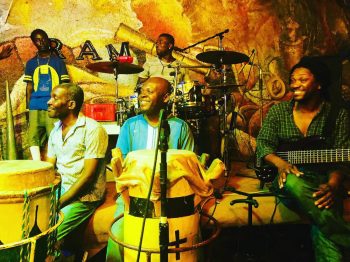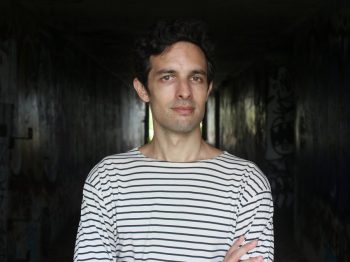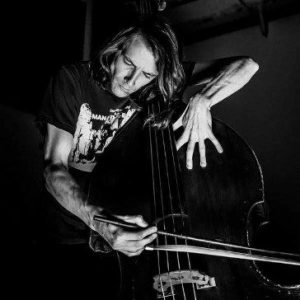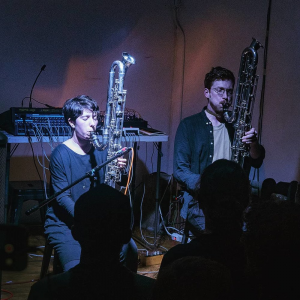By Denny Dyroff, Entertainment Editor, The Times
If you’re in the mood to hear live music that is different…music that you don’t usually hear on the internet or radio…then there are two music acts performing in Philadelphia this weekend that you should check out – RAM and Joe Moffett.
RAM, which is performing on May 26 at Myst Lounge (5835 Rising Sun Avenue, Philadelphia, 267-686-4101), is a Haitian Music band based in the city of Port-au-Prince, Haiti. Founded in 1990, the band derives its name from the initials of its founder, songwriter, and lead male vocalist — Richard A. Morse.
“My mom is from Haiti and my dad is from Connecticut,” said Morse, during a phone interview Thursday afternoon as he travelled from Charlottesville, Virginia to a gig at John and Peter’s in New Hope.
“I grew up in Connecticut, but I’ve been in Haiti since 1985. I’m a musician and I went down there looking for rhythm. It turned out to be a goldmine of inspiration.”
RAM has been producing quality music for more than 25 years. Recently, RAM released its seventh album, “August 1791.” On the album, ancient African and Haitian drums intertwine harmoniously with electric guitar riffs and swinging Caribbean melodies. The band is fronted by highly acclaimed Haitian singer Lunise Morse.
“Shortly after I got to Haiti, Jean-Claude (“President for Life” Jean-Claude Duvalier aka “Baby Doc”) left,” said Morse. “I didn’t know if I should stay or leave. I got a job at the Hotel Oloffson in Port-au-Prince – where I eventually took over.
“With the band, my wife opened the door for me because I had a hard time getting people to understand what I wanted to do. It started with a drum line and then we added bass and guitar and turned it into a band. We started playing at the hotel in 1991.”
If you made your way to Hotel Oloffson in Port-au-Prince almost any Thursday over the last 28 years, you would have been greeted by the raw and powerful music of RAM — ancient folkloric polyrhythms intertwining harmoniously with punk rock guitar riffs and swinging Caribbean melodies. It is at these now legendary sweat-drenched gigs where RAM established themselves at torchbearers of a Vodou rock sound.
Firmly rooted in a city that has seen much political upheaval, RAM has been a target of regime censorship, and has continued to be a voice for the people of Haiti throughout upheaval and change. One of the prominent bands in the mizik rasin musical movement, the band incorporates traditional vodou lyrics and instruments, such as rara horns into modern styles. The band performs in Haitian Creole, French, and English.
Rasin is a musical style that began in Haiti in the 1970s when musicians began combining elements of traditional Haitian Vodou ceremonial and folkloric music with rock and roll. This style of modern music reaching back to the roots of Vodou tradition came to be called mizik rasin (“roots music”) in Haitian Creole or musique racine in French.
“We got our push to fame when we had a song on the ‘Philadelphia’ soundtrack,” said Morse.
“Philadelphia,” the 1993 movie that starred Tom Hanks, had a stellar soundtrack with songs by Bruce Springsteen, Neil Young, Sade, the Neville Brothers, Maria Callas and Peter Gabriel. It also featured a song by RAM called “Ibo Lele (Dreams Come True).”
“We also had songs that took off because of social issues in Haiti,” said Morse.
In 1992, RAM began regularly playing a song entitled “Fèy,” the Creole word for “leaf.” The lyrics for the song were of Vodou folkloric origins, adapted to rasin music. Despite no overt references to the political situation, it was widely played on the radio and immediately taken up throughout the country as an unofficial anthem of support for Jean-Bertrand Aristide.
In December 1990, Aristide, a former Catholic priest, was elected President in the Haitian general election. In September of the following year, Aristide was overthrown by the military in the 1991 Haitian coup d’état.
By the summer of 1992, playing or singing the song was banned under military authority, and Morse was subjected to death threats from the regime. In one particular instance, Morse was summoned before Evans François, the brother of Colonel Michel François, who told Morse that any number of assassins would be willing to kill him for as little as fifty cents in payment.
Undaunted, RAM continued to play “Fèy” live at their weekly concerts at the Oloffson. The band would later document the François death threat in the mixed-language ballad “Gran Bwa,” released in 1997 on its second album, “Puritan Vodou.”
“‘Fèy’ came out and that was totally huge,” said Morse. “We became huge in the Haitian music scene with our mizik rasin.
“Mizik Rasin is all I know. But I don’t even call it mizik rasin – I call it Haitian music. Making this music is all I do. Once I discovered this, nothing else interested me.”
Moore may be a light-skinned Haitian-American from Connecticut but his link to Haitian roots music is real.
His father, Richard M. Morse, was an American academic sociologist and writer, and his mother, Emerante de Pradines (1918-2018), was a famous Haitian singer, dancer and folklorist — and the daughter of Haitian entertainer Auguste de Pradines.
Auguste Linstant de Pradines, also known as Ti Candio or Kandjo, was an influential Haitian musician who largely created the archetype of the Haitian troubadour. Over nearly five decades, de Pradines composed love songs as well as songs of political and social commentary.
“I grew up with this stuff,” said Morse, who has a degree in anthropology from Princeton University. “My mom made two albums of Vodou music and creole songs of Haiti.
“Now, RAM is making music of Haiti. We play a lot in Haiti and have done around 150 shows in the U.K. We’ve only recently started to tour in the United States. My son (William Morse) is a guitarist in the band and he wants to tour.”
Video link for RAM – https://youtu.be/tnEUfbwSEQc.
The show at Myst Lounge will start at 9 p.m. Tickets are $25.
You’ve never heard music like the music Joe Moffett will be performing this weekend – because neither has Moffett.
“It’s an improvising trio and the three of us haven’t done anything together before – not even rehearse,” said Moffett, during a phone interview Tuesday from his home in Brooklyn.
On May 25, Fire Museum Presents will have a show at The Random Tea Room (713 North Fourth Street, Philadelphia, http://firemuseumpresents.com) featuring Joe Moffett performing in a trio that also features Zach Rowden and John McCowen.
New York-based trumpeter and improviser Joe Moffett approaches his work with a keen interest in unconventional sounds and forms, collective composition, solo instrumental performance, and the intersection of words and music. He is a regular participant in the improvised/experimental music scene in Brooklyn and is a co-founder of ensembles such as Earth Tongues, Twins of El Dorado and the Kaplan/Merega/Moffett Trio. His material appears on Neither/Nor, Underwolf, Eh?, NotTwo, and Prom Night Records.
Zach Rowden deals with the acoustic and performative possibilities of the upright/electric basses. He is a soloist in Iancu Dumitrescu and the late Ana Maria Avram’s Hyperion Ensemble. Current collaborators include Tyshawn Sorey, Paul Flaherty, Michael Foster’s The Ghost, Robert Black, Chris Cretella, Matt Sargent. Charmaine Lee and Gus Caldwell. Venues that have welcomed him include Harpa (Reykjavik), Romanian Radio Hall (Bucharest), Cafe Oto (London), Heimathafen Neukölln (Berlin), Issue Project Room (New York), Firehouse 12 (New Haven), and Real Art Ways (Hartford).
John McCowen is a New York based composer and performer whose work focuses on extending the possibilities of the clarinet family. John embraces long-form drones, difference tones, and beating harmonics as a means to extrude the dimensionality within – treating the clarinet as an acoustic synthesizer. His works for ensemble utilize spectral techniques to superimpose the timbral/sonic characteristics of the clarinet onto a grouping of instruments. This may include the clarinet as a solo instrument while the ensemble functions as a resonant system.
“This is a pretty new trio,” said Moffett. “Zach plays bass. John plays contrabass clarinet and I play trumpet. I played with Zach in other contexts and once with John, but this will be a first time for us playing together.
“We have three shows this weekend – a house concert in New York on Friday, the Philly show on Saturday and a show Sunday in New Haven, Connecticut.
“This is just a live project, but we do want to record. So, we’re recording the show Sunday in New Haven, which is Zach’s hometown. John moved to New York two years ago from the Bay Area. I’ve been here 10 years. I grew up in a town near Worcester, Massachusetts and graduated from the New England Conservatory in Boston in 2006.”
Moffett explained how this weekend’s show came about – and what to expect.
“I was talking to Zach about doing some shows in May,” said Moffett. “I got in touch with Steven (Fire Museum Presents founder Steven Tobin) and he was able to find a date for us.
“I know Zach’s vocabulary pretty well and I know John’s work. I know what each other’s sounds are. We’ve talked about kinds of sounds an instrument does. We tend to do things on the noisy end of the spectrum. The instrumentation is already bass-heavy so that will be fun. It could be very droney – but it might not be. It will probably unfold very naturally.”
Video link for Joe Moffett – https://youtu.be/hO8xTzcEZRg.
Video link for Zach Rowden and John McCowen — https://youtu.be/g6xaVArVTu0.
The show at The Random Tea Room, which also features the Bonnie Lander/Allison Clendaniel Duo, will start at 7 p.m. Tickets are $8-10 sliding scale.










